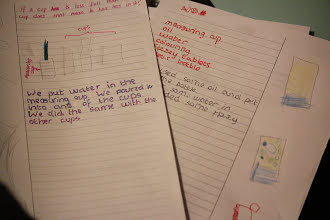Recently we've been writing a lot of what we call science reports. You could say that's because we've been doing a lot of science experiments. However, in the past we didn't often keep a written record of what we were doing. So I suppose you might ask why now?
Home Education comes in many shapes and colours. Every family does things their own way. Some have a curriculum some have no programme at all and let their children decide how they fill their days. Others like us fall somewhere in between. As our eldest daughter has got older we've become more organised. Mostly because that's what she's been asking for. But also because as her interests have emerged we want to make sure we're giving her the foundations she needs to achieve her goals. And that my friends means more science and perhaps more importantly a strong understanding of the scientific method. Writing up her lab work seems to me an essential part of the process.
All good scientists record their findings. As noted over at study.com,
"Science is all about collecting evidence, and if that evidence hasn't
been written down at the time, people have no way of knowing how
reliable your results may be."
Not only is this an essential tool for any budding scientist to master, it's also incredibly interesting in education on several layers. Firstly, for encouraging learners to communicate and share their discoveries in the written form. Secondly, for rubbing out the line that divides real scientists and them. As soon as they decide to do an experiment, to record some data, to further their understanding, they are scientists. Even if someone's taken the steps they're taking before them.
That said I can't emphasize enough that the most important thing is to get hands on with the kids and to make sure that what ought to be recorded in a report is covered orally. Ask the questions, what are we using today? What are we doing today? And perhaps most importantly of all, what do you expect to happen? and what is happening?
But back to the reports and how we do them! My kids are nearly 12, 8 and 5. They all like to do the experiments and they've all been involved with report writing. Here's how you can adapt science reports to different ages and keep it fun. Because making science fun is fast becoming my mantra. And guess what, I'm having a great time myself too!
Writing Science Reports
Whatever the age of the child a science report should cover 3 main areas:
- Materials
- Method
- Observations
Five and upwards
 |
Younger children like to do things like their older sibling. My youngest daughter loves writing reports for just that reason. However this age group can also have short attention spansit's best to keep reports concise. Lotta's reports answer the questions, what did we use? with a picture. And what did we do? with a couple of short sentences. As she likes to practice writing, I write these out for her in dot to dots and she traces them.
Seven and upwards
An older child can write a basic lab report. Although it may not be very detailed it prepares them for what may be required in the future. Noah doesn't like writing much for the moment. So although he is 8 we try to keep his reports brief. We organise it as follows:
- Our tools
- Our method
- Observations
Eleven and upwards
By this age a lot of children are more comfortable with writing and recording their own thoughts. They're also open to following a model. Maya enjoys this kind of written work and so her science reports are longer and more detailed.
We are focussing on the scientific method and so I encourage her to order her reports as follows:
- Title
- Hypothesis (if valid as some of our experiments are demonstrations)
- Materials
- Method
- Observations
- Results (again if valid, this is often covered in the observations for the moment)
- Science (this could also be a conclusion but Maya likes to record a bit of what she's learnt about the science behind whatever experiments we do).
Maya often illustrates her report with pictures. Recently she also included a table with mass, volume and density using the formula mass/volume = density to fill in the third column. With each report I can see that she'd refining her written skills and gaining a deeper understanding of the value and importance of record keeping.
To conclude, as I said at the beginning, we haven't been recording our scientific experiments for long and we no doubt still have a lot to learn but I hope this quick guide might be as helpful as this one was to me. For now, the kids are enjoying writing their reports.
We also chat about what we've done with other family members who weren't present (dad, grandparents...) which gives the children another opportunity to process what they did and what they observed. And that act of processing and communicating to someone else what you did is what it's all about really.
More science fun soon with weather reports and density. And also coming up soon, digging in to history and geography with lego, tv and lots more.






No comments:
Post a Comment